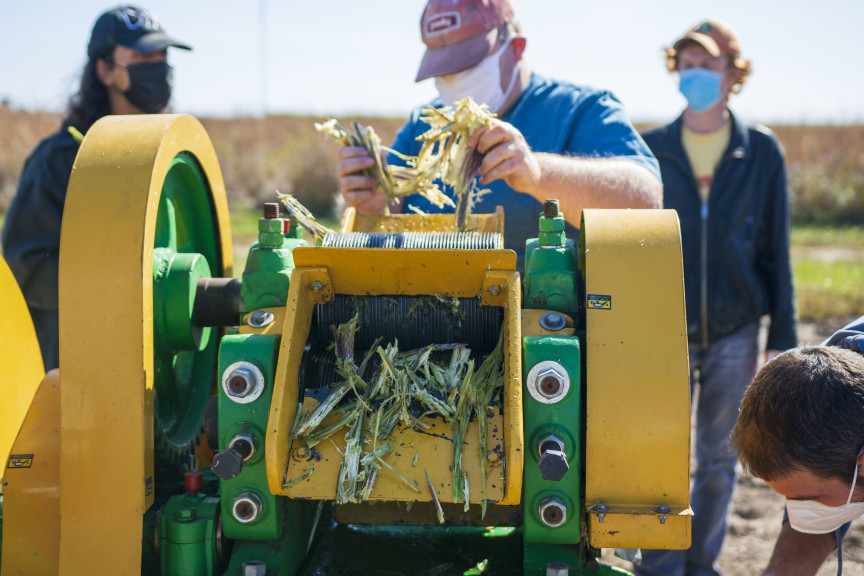UI expert predicts sustainable bio-based economy design by 2027

CABBI researchers feed harvest into a juicer at the Illinois Energy Farm Plots to obtain its natural sugars and oils. The researchers are some of many national CABBI faculty partnered with the University of Illinois to find sustainable bioenergy sources. Photo courtesy of the Center for Advanced Bioenergy and Bioproducts Innovation (CABBI)
CHAMPAIGN – Experts from the University of Illinois Urbana campus predict the development of an eco-friendly economy within the next five years after the U.S. Department of Energy renewed the Center for Advanced Bioenergy and Bioproducts Innovation (CABBI).
On March 17, the DOE committed over $590 million to renew its four existing bioenergy research centers, according to a news release on the department’s website.
CABBI, a bioenergy research center at the University of Illinois, received a five-year extension of research funds, with a collective total of $237.9 million in funding from 2017 through 2027, according to the center’s website.
Wendy Yang, the sustainability research leader at CABBI, said the renewal will allow researchers to make strides toward developing sustainable and profitable plant-based energy systems.
“After the next five years of research, CABBI researchers will have generated the data, knowledge and tools needed to design a sustainable bio-based economy from the field scale,” Yang said.
CABBI is led by the University of Illinois and partners with more than 20 institutions nationwide, she said.
“The University of Illinois Urbana-Champaign has become an international leader in multidisciplinary research for the public good,” Yang said, “helping to fundamentally transform the U.S. economy to a sustainable bioeconomy and to drive the nation toward energy independence.
“In our first phase of funding, we made a lot of breakthrough discoveries in fundamental knowledge…so we're really excited for these next five years to be able to follow through with those additional discoveries.”
About half of the funds will be given to the 20 subcontracted institutions, with the other half going to CABBI’s home campus at the U of I, said Andrew Leakey, the director of CABBI and head of the Plant Biology department at the U of I.
About half of the 60 faculty members at CABBI are based out of the U of I, Leakey said.
The project spreads across three U of I colleges, he said, including the College of Liberal Arts and Sciences, the College of Agricultural, Consumer and Environmental Sciences, and the Grainger College of Engineering.
The funds will be distributed among CABBI’s three missions: sustainability, conversion, and feedstock production, he said.
CABBI’s work is becoming increasingly important because of the elevated levels of greenhouse emissions into the atmosphere, Leakey said.
“For the last 150 years or so, we have fueled all of our technological and societal progress on burning fossil fuels,” Leakey said. “When we take a source of carbon that is locked up in the ground and release it into the atmosphere, it can warn the atmosphere through a process called the Greenhouse Effect.
“It's making our planet a more difficult place to live on.”
CABBI will continue to research plant-based bioenergy to manage and decrease carbon dioxide levels in the atmosphere, Leakey said.
“We're trying to design the system so that it takes more carbon dioxide out of the atmosphere than it puts in, whereas up until now, we've just been adding more and more carbon dioxide to the atmosphere,” he said.
Since 2017, CABBI has had numerous scientific successes regarding plant resiliency, oil extractions, fermentation, plant-based engineering and many others, Leakey said.
“But we need to be able to do all of those things better than we can right now,” he said.“This next phase, the objective is to improve upon those initial successes to get ourselves to a point where it really would offer farmers a better alternative to the crops they're currently growing.”

